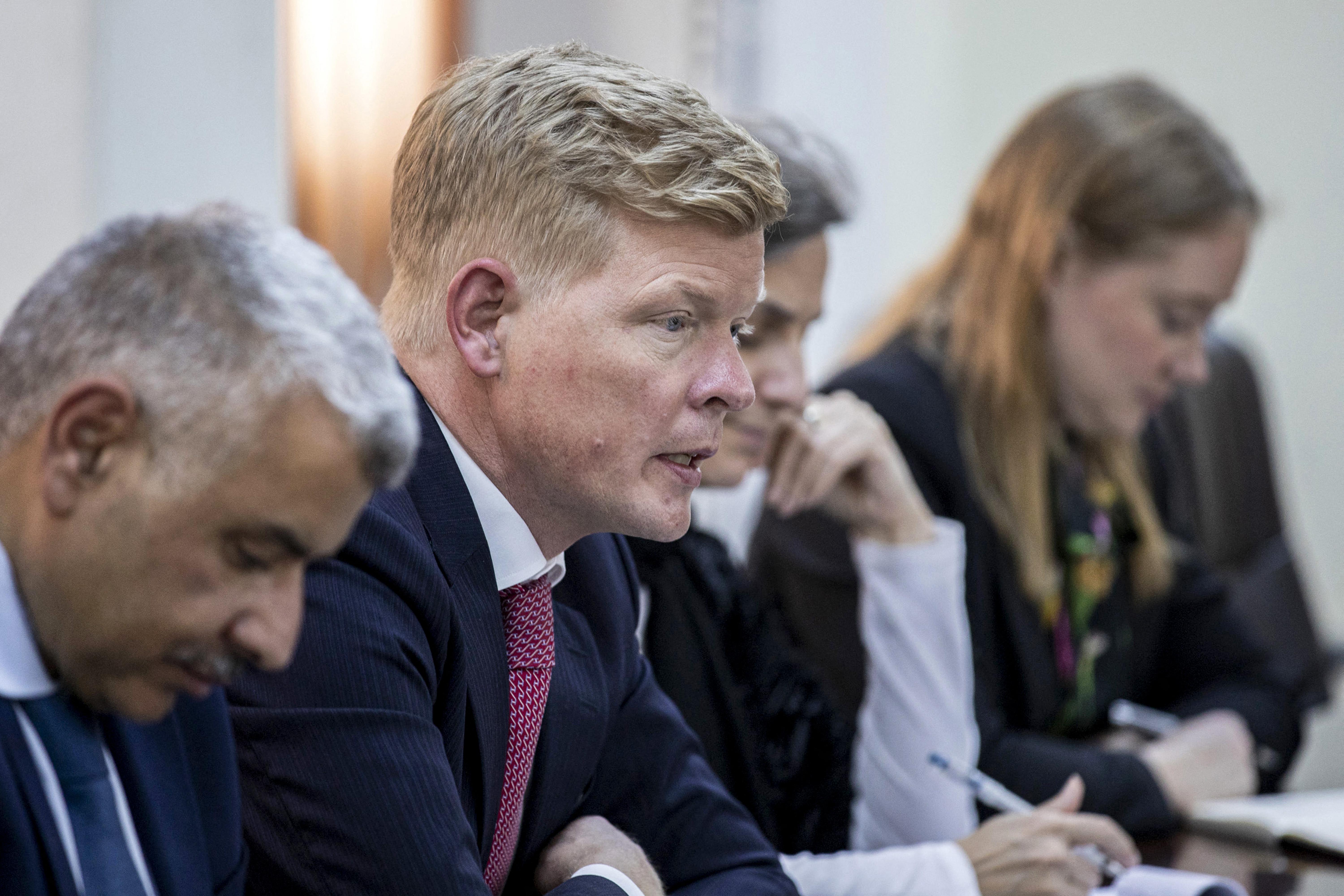 Hans Grundberg (center), the United Nations' special envoy for Yemen, meets with local officials in the country's third city of Taez on Feb 12, 2024. (PHOTO / AFP)
Hans Grundberg (center), the United Nations' special envoy for Yemen, meets with local officials in the country's third city of Taez on Feb 12, 2024. (PHOTO / AFP)
SANAA/ADEN, Yemen - The UN Special Envoy for Yemen, Hans Grundberg, on Wednesday warned that the military escalation in the Red Sea linked to the Israel-Hamas conflict in Gaza has a negative impact on the peace efforts in Yemen.
"Rising regional tensions linked to the war in Gaza, and in particular the military escalation in the Red Sea, are slowing down the pace of peace efforts in Yemen," Grundberg said in a live briefing to the UN Security Council.
The UN envoy said Yemen's rival parties vowed to operationalize commitments through a UN roadmap agreement in December last year, including a nationwide ceasefire, measures to improve living conditions, and restarting an intra-Yemeni political process.
ALSO READ: Yemen's Houthis vow to retaliate for US-British airstrikes
"Mediation efforts in Yemen cannot be neatly cordoned off. What happens regionally impacts Yemen, and what happens in Yemen can impact the region," he said.
On Tuesday, Houthi leader Abdulmalik al-Houthi said in a televised speech that he has "no intention" to sabotage submarine internet cables in the Red Sea
Grundberg pointed out that the scale of economic challenges across the country is staggering. Civil servants, especially in Houthi-controlled areas, haven't been paid salaries in full, and people in government-controlled areas face extended power outages and rising prices.
The Houthi group, which controls much of the northern populous area, has escalated attacks on commercial vessels and navy ships of Israel, the United States, and Britain since mid-November last year, in what the group said in support of Palestinians against Israeli war in Gaza.
READ MORE: US-British airstrikes hit Houthi targets in northern Yemen
On Tuesday, Houthi leader Abdulmalik al-Houthi said in a televised speech that he has "no intention" to sabotage submarine internet cables in the Red Sea, a critical component in the global digital infrastructure, but he vowed to continue missile attacks against Israeli, US, and British ships transiting the Red Sea until Israel stops war on Gaza.
The military escalation in the Red Sea has forced major shipping companies to re-route around the African continent, causing prices of shipping and goods to increase dramatically.
According to daily reports aired by Houthi-run al-Masirah TV, the Houthi group has recruited thousands of Yemeni tribal youths since the Israel-Hamas war broke out on Oct 7, 2023.
The Houthis trained those youths and equipped them with new weapons, telling them to get ready to go to the frontlines to fight "pro-US Yemeni government forces," said the reports.
READ MORE: China stresses commitment to Yemen's political solution
The Yemeni government army controls all oil-rich provinces and cordoned off all Houthi-controlled northern provinces.
The United Nations has been trying to bring Yemen's rival parties to negotiations since the start of the civil war in late 2014, when the Houthis stormed and seized several northern provinces, forcing the Yemeni government out of the capital Sanaa.
 People shop at a street market in Yemen's third city of Taiz, on Feb 7, 2024. (PHOTO / AFP)
People shop at a street market in Yemen's third city of Taiz, on Feb 7, 2024. (PHOTO / AFP)
Relocation to Aden
Yemen's internationally recognized government on Wednesday called on all international and regional aid organizations operating in the country to relocate their headquarters from the Houthi-held capital Sanaa to Aden.
In a statement, Yemen's Ministry of Planning and International Cooperation urged all aid groups to move their main offices to Aden as part of an effort to "arrange institutional work and unify efforts" in the war-torn Arab nation.
The ministry also asked aid groups to open bank accounts with Yemen's Central Bank based in Aden.
There has been no immediate response from the various UN agencies and non-governmental organizations active in Yemen regarding the relocation request
The ministry said it would "provide full facilities to ensure a smooth and successful transfer" to Aden, the seat of the internationally recognized administration. It also vowed continued support for "sincere organizations" providing humanitarian and development aid in Yemen.
READ MORE: UN, partners seek $2.7b to aid war-torn Yemen
There has been no immediate response from the various UN agencies and non-governmental organizations active in Yemen regarding the relocation request.
Most major aid organizations have kept their Yemen operations headquartered in Sanaa since it was seized by the Houthi group in late 2014. Yemen's government argues the city is no longer a legitimate base for overseeing activities in the country's war-ravaged areas.
Yemen has been depending heavily on international assistance since the civil war broke out in 2014 between the government and Houthi forces. The relocation request reflects ongoing tensions between the rival parties over the control of the aid response.
ALSO READ: New prime minister appointed in Yemen amid dire challenges
Observers warn that the politicization of aid may lead to hampering delivery and compounding suffering in what the UN calls the world's worst humanitarian crisis. Over 4 million Yemenis have been displaced by the conflict, which has pushed much of the population to the brink of famine.


